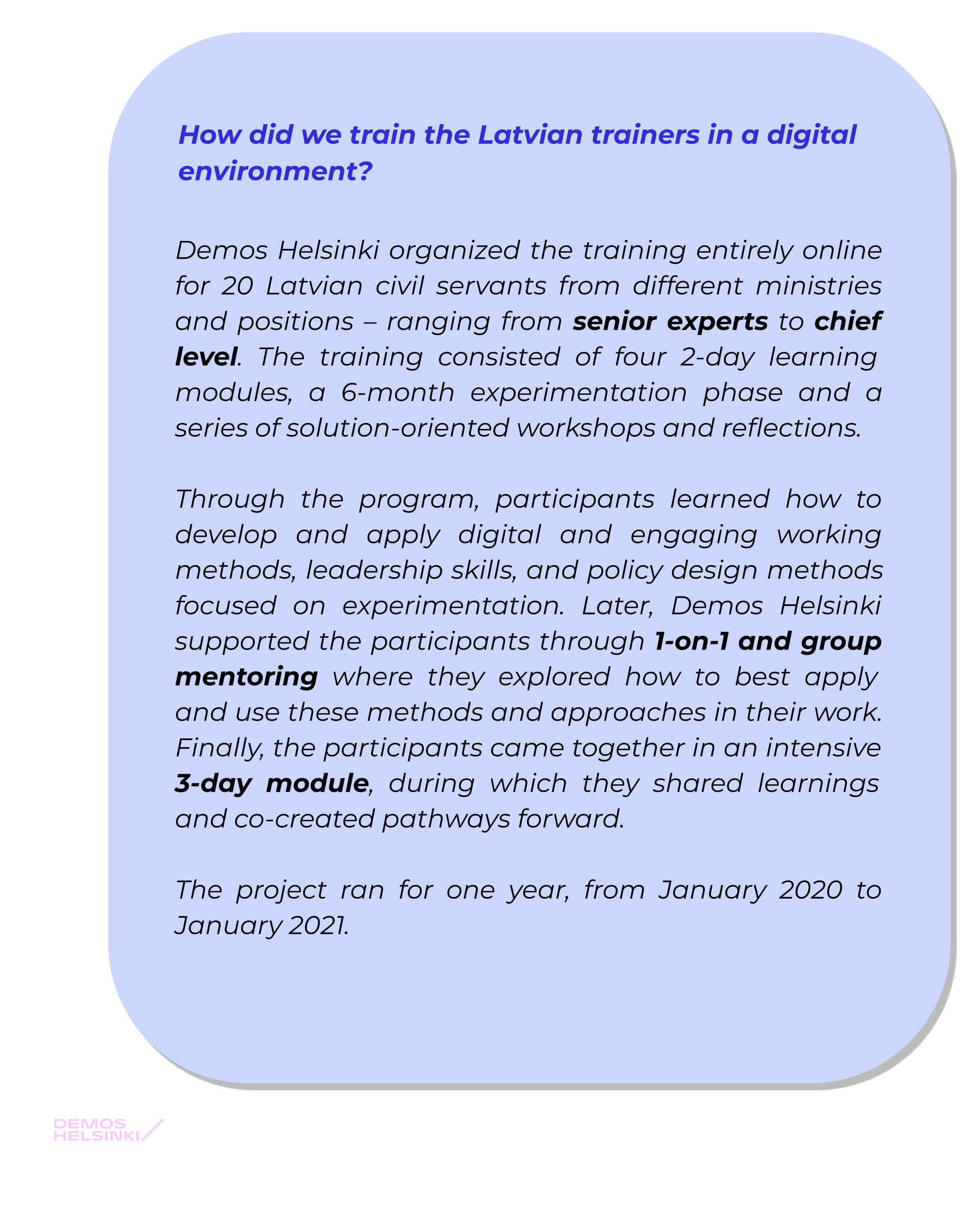Founded in 1993, the Latvian School of Public Administration is one of the leading training centers in the Baltics region. Every year, it serves the development needs of +12 000 civil servants and public administration employees. Aiming to advance a learning culture across the whole of the Latvian public sector,…
Founded in 1993, the Latvian School of Public Administration is one of the leading training centers in the Baltics region. Every year, it serves the development needs of +12 000 civil servants and public administration employees. Aiming to advance a learning culture across the whole of the Latvian public sector, the School does so by going beyond lecture-based methods and actively striving to promote innovative training approaches.
In this context, Demos Helsinki was commissioned by the Latvian School of Public Administration to design and carry out a policy design training on experimentation for trainers of Latvian civil servants. See the experimentation guidelines here.
Why Experimentation?
The traditional way of making policies is often devised as a linear and slow process. While this may increase the predictability of its unfolding, it also presents several challenges to policymakers and trainers. These include:
- The problem definition the policy aims to solve is often underspecified.
- Lessons about whether a policy works to solve a given problem are rarely distilled.
- Policymaking and policy implementation are often separated fields, led by different people missing out from the benefits of coordinated and coherent action.
- Closed government silos don’t facilitate cross-departmental communication, dissemination of know-how, and agile implementation.
To address these challenges, we worked with the Latvian School of Public Administration to help civil servants renew their policy design tools to embed the characteristic of experimentation within them. The primary goals were to:
Enable flexibility in policymaking –> civil servants learn to work with uncertainty
Support greater public involvement –> civil servants grow new collaborative skills
Promote user-oriented approaches –> civil servants use iterative design methods
Introduce foresight methodologies –> civil servants learn to synthesise complex information and build proactive policies
We know that governments can’t have all the answers always ready at hand. This is why experimentation can play a critical role in informing public action. By enabling continuous learning and wider flexibility, it hastens the pace of policymaking while making it growingly informed, meaningful, and coherent. It embeds humility in governance.

This training program is part of our mission to empower a civil service fit for the 21st century.
For more information or to build a training program specifically targeted to your civil service, please contact:
Mikael Sokero
Senior Expert
mikael.sokero@demoshelsinki.fi
See our other similar work:
- Building capacities for a 21st-century civil service
- Training Future Leaders in the Finnish civil service
- Training Agile Leaders in Bahrain
- Capacities for anticipatory policymaking in North Macedonia
Relevant projects
Feature Image: Ingus Kruklitis / iStock

Training Agile Leaders in Bahrain
Project
June 20, 2022
Training Future Leaders in the Finnish civil service
Project
June 20, 2022
Capacities for anticipatory policymaking in North Macedonia
Project
June 20, 2022
Anticipatory migration policy in North Macedonia
Project
April 27, 2022
Experimentation Guidelines for the Latvian Public Sector
Publication
April 21, 2021
A Call for Humble Governments
Publication
September 17, 2021
Capacity building
Theme
December 5, 2024
Innovating urban development: Lessons from M4EG & moving beyond growth
Post
April 17, 2025